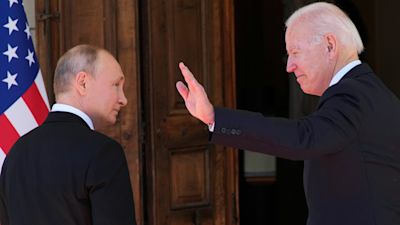Insight
US says it’s unleashed brutal sanctions on Russia but stops short of hitting Vladimir Putin

The US is attempting to weaponise the dollar and put pressure on Russia's economy, reports US Correspondent Emma Murphy
In geopolitics, as in so much of life, when it comes down to the brass tacks things get tricky and that is where the alliance against Russia faces a huge challenge.
Every nation in the coalition speaks of wanting to hit Vladimir Putin in the pocket but they know that his pocket and theirs are not so far removed.
In squeezing Russia’s economy they will squeeze their own.
Every country has it’s cup of tolerance when it comes to how much of their economy the are willing to risk.
The US had promised big sanctions and tried to sell their first wave as much more impactful than they actually were.
Why has Russia invaded Ukraine and can Putin be stopped? Our experts tell you what you need to know in our latest podcast. Listen here:
Now they have delivered with the big hitters, “the mother of all sanctions package” as it was dubbed.
Russia’s biggest bank is sanctioned along with others, that’s a trillion dollars in assets frozen.
Also some of the biggest companies, in particular those involved in the development of the military. So too some of Russia’s wealthiest, targeted personally.
This is an attempt to weaponise the dollar and put the pressure on the Russian economy in the short and long term.
Yet they stopped short of sanctioning Putin himself and that is where there is real leverage.
His vulnerability is his personal fortune and for all he appears to despise the West that is where he has it squirreled away. Perhaps President Biden is holding that back incase it is needed further down the line.
He was very clear he did not see sanctions as a way to stop Russia instantly, but to put the squeeze on in the long term.
The reality is the squeeze will also be put on Western economies. There will be an attempt insulate against the worst of it but it will happen.
They are tough decisions but history tells that tough decisions now may prevent tougher ones further down the road.